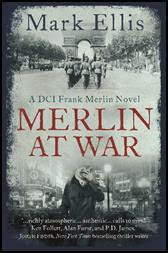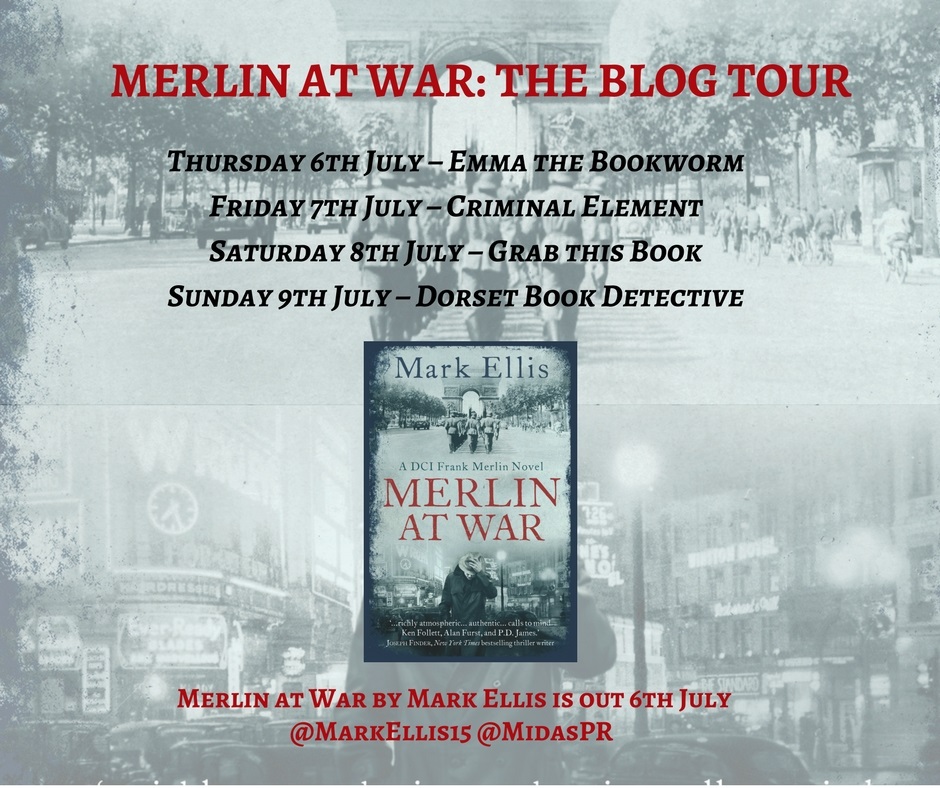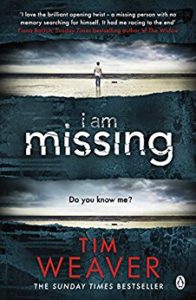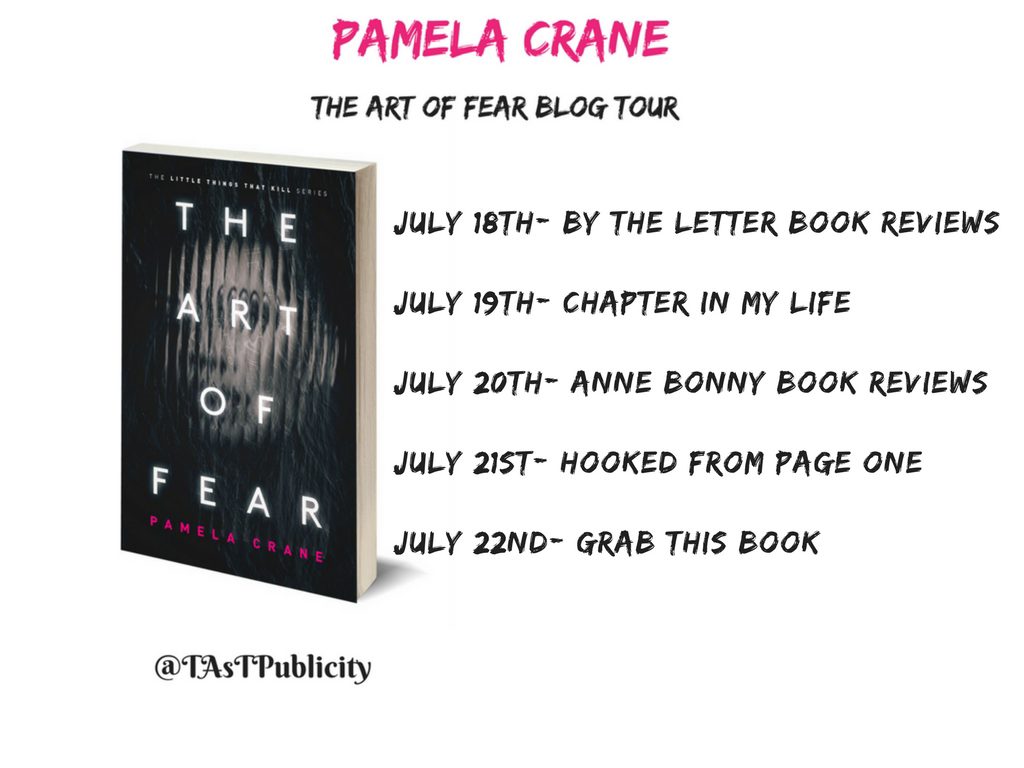
Today I am delighted to host the latest leg of the Merlin at War blog tour. The new DCI Frank Merlin novel released on 6 July and I have an extract from the book to give you a taste of the action. First the book description:
War rages across Europe. France is under the Nazi thumb. Britain has its back to the wall. In London, Scotland Yard detective Merlin investigates a series of disturbing events – a young girl killed in a botched abortion, a French emigre shot in a seedy Notting Hill flat, a mysterious letter written by a British officer, gunned down in Crete. With action spanning Buenos Aires, New York, Cairo and Occupied France, Merlin and his team are plunged into a dark world of espionage, murder, love and betrayal.
My thanks to Eve at Midas PR for the chance to join the tour.
Vichy France, May 1941
The birds were chattering melodiously in the plane trees of the Parc des Sources. The two men, one in uniform and flourishing a white military baton, the other in a baggy but expensive civilian suit, sauntered out of the Hotel Splendide, followed at a distance by a small group of military men and secretaries. The outside tables at the Grand Café were crowded in the balmy late-spring sun. Several of the male customers rose to tip their hats to the strollers while as many ladies, some young, some old, smiled by way of respect.
The civilian, short and dark, with a cowlick of oiled hair and a thick black moustache, acknowledged the signs of deference with a nod of the head and the crinkling of an eye. His stiffly erect companion responded with a raised eyebrow and a baton tap of his kepi. They walked in silence under the café awnings towards Les Halles de Sources before turning into the park. Fifty yards on, they found a park bench in a secluded area of rhododendron bushes and fuchsias and seated themselves. Their attendant party took up position nearby, just out of earshot, beside a small clump of chestnut trees. In the distance, a brass band was playing a selection of military airs.
“So, Admiral, the marshal tells me your trip to Paris was a success.”
Jean Louis Xavier François Darlan, admiral of France and the senior minister in Marshal Philippe Pétain’s Vichy government, stroked his cheek. “Yes, all went as planned, Pierre, although little has been finalised as yet.”
Pierre Laval, former prime minister of France and, until recently, vice-president of Vichy France’s Cabinet of Ministers, chuckled and patted his companion on the knee.
“The marshal mentioned no qualifications. He told me you had got everything he wanted from the Germans. Said you had got the occupation costs to us down from 20 million reichsmarks a day to 15 million, the return of nearly 7,000 of our best people from the German prisoner-of-war camps, and a considerable improvement on the current restrictions in our dealings with the other France.”
“By the other France, Pierre, I take it you mean occupied France?”
“Do not be a pedant, my friend. You know that is what I mean. We need to free up the limitations of our trade so that the French state can benefit to the maximum from our partnership with the Germans.”
The admiral pursed his lips. “You use the word ‘partnership’ Pierre. Others use the word ‘collaboration’, which has a less satisfactory ring.”
Laval rose stiffly to his feet and circumnavigated the bench. When he regained his seat, Darlan noted the unhealthily red flush on his cheeks.
“Partnership or collaboration, what does it matter? We were in a mess and we have found a way for some kind of France to survive. At least Herr Hitler provides us with a bulwark against a worst danger.”
“And, pray, what worst danger is that, Pierre?”
“Why, Bolshevism, of course. The local Bolshevism, which we had to combat before the war, and the greater Bolshevism represented by that maniac Stalin. Hitler is by far the lesser of two evils in that context.”
“Those Frenchmen languishing currently in Hitler’s camps would find it hard to agree with your analysis, I think.”
“But you are gradually getting many of those Frenchmen home, François. That is part of the deal you have just struck, is it not?”
“In return for, among other things, allowing Germany access to our military facilities in Tunisia, Syria, Lebanon and our possessions in west Africa. No doubt ‘access’ will prove a polite substitution for ‘control’.”
Laval stroked his moustache thoughtfully. “And what is so bad about that in the overall scheme of things, if we can recover a much greater level of independence for Vichy France and further the cause of reunification with ‘the other’ France?”
The admiral removed a handkerchief from his jacket pocket and mopped his brow. The May sun was now at its highest point in the heavens and was beating down from a now cloudless sky.
“Perhaps you are right, Pierre, although I somehow doubt that Herr Hitler fails to realise the strength of his negotiating position and the weakness of ours. Dealing with your friend the German ambassador in Paris is one thing but… Of course, Herr Abetz was a fine host and I have to say I was impressed by the restraint with which, under his leadership, the German occupying forces go about their business in Paris.”
The two men sat silently for a while, enjoying the warmth of the day, the mild relieving breeze and the mingled music of birdsong and trombone. For a moment, the heavy burdens on their shoulders lifted and a different France, the old France, took shape around them. Their brief reverie was interrupted by one of the admiral’s men, who ran over to deliver a note. Darlan read it and sighed.
“The marshal wants to see me again at four. When do you think you will be regaining your place in the council, Pierre?”
Laval smoothed some of the creases in his baggy pinstripe trousers and shrugged. “I serve at the marshal’s discretion. As you know, there are voices speaking against me. It is tiresome but I can handle it. Sooner rather than later is the answer to your question, I believe.”
“The marshal still values your advice above all others.”
“Indeed, François. But back to those agreements with Abetz, the Paris Protocols I understand we must now call them. What next?”
Darlan slowly rose to his feet. “They must be ratified by Berlin and by us. Although I have negotiated the protocols myself, I am not completely happy with them. As for Berlin, who knows how long they will take?” The admiral looked up to the sky and sighed. “Such a beautiful day to be discussing these uncomfortable matters.”
Laval stood. “Before we go back, François, have you been briefed recently on the activities of Monsieur de Gaulle and his so-called ‘Free French’ forces in London?”
Darlan looked up, distracted for a moment by what appeared to be a fierce disagreement among the pigeons. He returned his eyes to Laval. “I see the same security reports as you, no doubt, Pierre.”
“And what about the intelligence on the activities of the socalled Resistance here in Vichy and elsewhere in France?”
“I believe I am up to speed. As yet these people appear to pose only a minor threat to us or the occupiers.”
“So the cabinet report says but I have my own sources. I understand from them that the anti-government forces here are going to be receiving direct assistance from abroad.”
“From abroad?”
“From England. In fact, according to my sources, the English secret services have already sent agents over here.”
“Two agents, perhaps three, I understood, Pierre. Is that anything to be particularly concerned about? Naturally, the British will deploy intelligence and counter-intelligence agents as the war proceeds. I would guess that the SS and other German agencies will be well on top of such problems.”
Laval shrugged. “As you say, the Germans should be on top of this. Meanwhile, our own people will be vigilant and I am happy to know that we have our own viable sources here and abroad. Now, my friend, I believe we have time for a quick bite. If we return to my rooms at the hotel, I’m sure my people can rustle up a nice bit of beef and a fine burgundy to accompany it. Shall we?”
The two men retraced their steps to the marshal’s seat of government at the Hotel Splendide, knowledging the renewed greetings of the people again in dignified fashion.
Merlin at War by Mark Ellis is out now (hardback £12.99, London Wall Publishing)
You can order a copy of the book here: https://www.amazon.co.uk/Merlin-War-DCI-Frank-Novel/dp/0995566712/ref=tmm_pap_swatch_0?_encoding=UTF8&qid=&sr=

 Did You See Melody? – Sophie Hannah
Did You See Melody? – Sophie Hannah The Doctor (with his Capaldi face), Bill and Nardole. The trio find themselves in Edinburgh and they have broken curfew – imposed as a plague is laying waste to the city. As a Scottish type person I loved this story. As a Glasgow Scottish type person I liked that the plague was in Edinburgh
The Doctor (with his Capaldi face), Bill and Nardole. The trio find themselves in Edinburgh and they have broken curfew – imposed as a plague is laying waste to the city. As a Scottish type person I loved this story. As a Glasgow Scottish type person I liked that the plague was in Edinburgh  I have seen this getting a big push via online adverts. It is another story which requires a big buy-in from the reader. If you just go along with the assumption that the husband/wife lead characters are wholly embracing The Marriage Pact then this is a solid thriller which is ideal for a holiday read. Again book groups on standby – not everyone is going to be happy with the concept that two successful professionals would accept The Pact without question and debate should ensue.
I have seen this getting a big push via online adverts. It is another story which requires a big buy-in from the reader. If you just go along with the assumption that the husband/wife lead characters are wholly embracing The Marriage Pact then this is a solid thriller which is ideal for a holiday read. Again book groups on standby – not everyone is going to be happy with the concept that two successful professionals would accept The Pact without question and debate should ensue.














